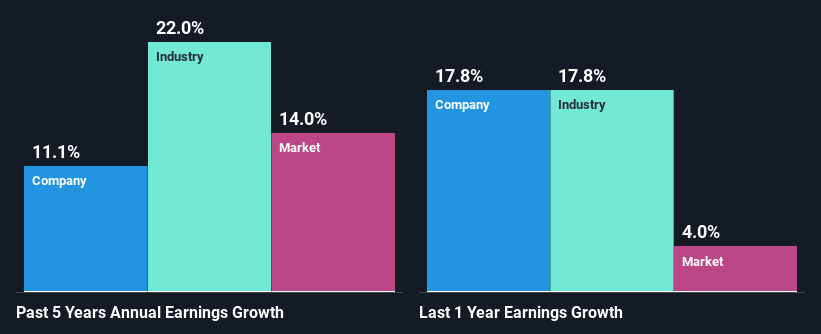Should Weakness in Spur Corporation Ltd's (JSE:SUR) Stock Be Seen As A Sign That Market Will Correct The Share Price Given Decent Financials?
It is hard to get excited after looking at Spur's (JSE:SUR) recent performance, when its stock has declined 4.5% over the past three months. However, the company's fundamentals look pretty decent, and long-term financials are usually aligned with future market price movements. Particularly, we will be paying attention to Spur's ROE today.
Return on equity or ROE is a key measure used to assess how efficiently a company's management is utilizing the company's capital. In other words, it is a profitability ratio which measures the rate of return on the capital provided by the company's shareholders.
Check out our latest analysis for Spur
How Is ROE Calculated?
The formula for return on equity is:
Return on Equity = Net Profit (from continuing operations) ÷ Shareholders' Equity
So, based on the above formula, the ROE for Spur is:
30% = R241m ÷ R796m (Based on the trailing twelve months to December 2023).
The 'return' is the yearly profit. So, this means that for every ZAR1 of its shareholder's investments, the company generates a profit of ZAR0.30.
What Has ROE Got To Do With Earnings Growth?
Thus far, we have learned that ROE measures how efficiently a company is generating its profits. We now need to evaluate how much profit the company reinvests or "retains" for future growth which then gives us an idea about the growth potential of the company. Assuming everything else remains unchanged, the higher the ROE and profit retention, the higher the growth rate of a company compared to companies that don't necessarily bear these characteristics.
Spur's Earnings Growth And 30% ROE
Firstly, we acknowledge that Spur has a significantly high ROE. Further, even comparing with the industry average if 30%, the company's ROE is quite respectable. The high ROE therefore is what most likely laid the ground for the decent growth of 11% seen over the past five years by Spur.
Next, on comparing with the industry net income growth, we found that Spur's reported growth was lower than the industry growth of 22% over the last few years, which is not something we like to see.
Earnings growth is an important metric to consider when valuing a stock. What investors need to determine next is if the expected earnings growth, or the lack of it, is already built into the share price. By doing so, they will have an idea if the stock is headed into clear blue waters or if swampy waters await. Is Spur fairly valued compared to other companies? These 3 valuation measures might help you decide.
Is Spur Making Efficient Use Of Its Profits?
While Spur has a three-year median payout ratio of 73% (which means it retains 27% of profits), the company has still seen a fair bit of earnings growth in the past, meaning that its high payout ratio hasn't hampered its ability to grow.
Additionally, Spur has paid dividends over a period of at least ten years which means that the company is pretty serious about sharing its profits with shareholders.
Summary
On the whole, we do feel that Spur has some positive attributes. The company has grown its earnings moderately as previously discussed. Still, the high ROE could have been even more beneficial to investors had the company been reinvesting more of its profits. As highlighted earlier, the current reinvestment rate appears to be quite low. Until now, we have only just grazed the surface of the company's past performance by looking at the company's fundamentals. To gain further insights into Spur's past profit growth, check out this visualization of past earnings, revenue and cash flows.
Have feedback on this article? Concerned about the content? Get in touch with us directly. Alternatively, email editorial-team (at) simplywallst.com.
This article by Simply Wall St is general in nature. We provide commentary based on historical data and analyst forecasts only using an unbiased methodology and our articles are not intended to be financial advice. It does not constitute a recommendation to buy or sell any stock, and does not take account of your objectives, or your financial situation. We aim to bring you long-term focused analysis driven by fundamental data. Note that our analysis may not factor in the latest price-sensitive company announcements or qualitative material. Simply Wall St has no position in any stocks mentioned.

